- Home
- Georgette Heyer
Devil’s Cub at-2 Page 18
Devil’s Cub at-2 Read online
Page 18
“No, sir, that I am sure she has not,” Mary said.
He looked at her in a hurt way that touched her. “When I tell you, ma’am, that from the moment of my arrival in Paris Miss Marling has persistently encouraged the advances of a certain French gentleman not unconnected with her family, and has upon every occasion preferred his company to mine, you will hardly assure me that her affections are unchanged.”
“But I do, sir,” Mary said earnestly. “I do not know how she may have behaved to you, but you must bear in mind that she is as wilful as she is pretty, and delights, perhaps unwisely, in provoking people with her teasing ways. The gentleman you refer to is, I take it, the Vicomte de Valmé. I believe you have no need to feel alarm, Mr. Comyn. The Vicomte is no doubt entertaining, and his address is insinuating. But he is nothing but a rattle, when all is said, and I do not think for an instant that Juliana cares a fig for him.”
“You know the Vicomte, ma’am?” said Mr. Comyn quickly.
“I have met him, sir.”
Mr. Comyn said in a repressed voice: “You have been an inmate of this house for two days, ma’am, and I understand from Juliana that you do not go out. I infer therefore that you have met the Vicomte here—within the past forty-eight hours.”
Miss Challoner said cautiously: “And if I have, sir, what is there in that to annoy you?”
“Only,” replied Mr. Comyn sharply, “that Juliana denied that de Valmé had visited her here.”
Miss Challoner, feeling very guilty, could think of nothing to say. Mr. Comyn, rather pale about the mouth, said bitingly: “It is all of a piece. I begged Juliana, if she cared for me, not to be present to-night at a ball given by the Vicomte’s parents. It was a test of her affection which I, foolishly, believed would not be too severe. I was wrong, ma’am. Juliana has been playing with me—I had almost said flirting with me.”
Miss Challoner, feeling that it was tune someone took the young couple in hand, proceeded to give Mr. Comyn her good advice on the management of a spoiled beauty. She tried to make him understand—but with indifferent success, since she did not understand it herself—that Juliana was so high-spirited that a breath of opposition induced her to behave outrageously. She told Mr. Comyn that to reproach Juliana, or to remonstrate with her was to drive her into her naughtiest mood. “She is romantic, Mr. Comyn, and if you desire to win her you should let her see that you are a man who will not brook her trifling. Juliana would love you to run off with her by force, but when you are gentle, sir, and respectful, she becomes impatient.”
“You suggest, in fact, ma’am, that I should abduct Miss Marling? I fear I am quite unlearned in such ways. Her cousin, the Marquis of Vidal, would no doubt oblige her.”
Miss Challoner coloured, and looked away. Mr. Comyn, realizing what he had said, coloured too, and begged her pardon. “I did not desire to elope with her, even were she willing,” he continued hurriedly. “But she deemed it our best course, and when I was urged to it by a member of her family, I allowed my scruples to be overruled, and came to Paris with the express intention of arranging a secret marriage.”
“Well, arrange it, sir,” Miss Challoner advised him.
“I had almost done so, ma’am. I may say that I bear in my pocket at this moment the direction of an English divine at present travelling through France on his way to Italy. I came here to-night expecting to see Juliana, and to tell her that we have nothing more to wait for. And I find that she has gone, in defiance of my expressed wish, to a ball where the chief—the sole attraction is the Vicomte de Valmé. Madam, I can only designate such conduct as heartless in the extreme.”
Miss Challoner paid very little heed to the last part of this speech, but said rather breathlessly: “You know of an English divine? Oh pray, sir, have you told my Lord Vidal?”
“No, ma’am, for—”
“Then do not!” Mary said, laying her hand on his. “Will you promise me that you will not tell him?”
“Madam, I regret infinitely, but you are under a misapprehension. It was Lord Vidal who told me.”
Mary’s hand fell again to her side. “When did he tell you?”
“This afternoon, ma’am. He was good enough, at the same time, to present me with a card for this ball at the Hotel Saint-Vire. Apparently he knows his cousin better than I do. I never dreamed that she would go.”
“This afternoon .... Oh, I hoped he would not be able to find a Protestant to marry us!” Mary exclaimed unguardedly. “What shall I do? What in the world shall I do?”
Mr. Comyn regarded her curiously. “Do I understand, ma’am, that a marriage with Lord Vidal is not your desire?”
She shook her head. “It is not, sir. I am aware that you must think my conduct—my compromising situation—”
She got up, averting her face.
Mr. Comyn also got up. He possessed himself of both her hands, and held them in a comforting clasp. “Believe me, Miss Challoner, I understand your feelings exactly. I have nothing but the deepest sympathy for you, and if I can serve you in any way I shall count it an honour.”
Miss Challoner’s fingers returned the pressure of his. She tried to smile. “You are very kind, sir. I—I thank you.”
The click of the door made her snatch her hands away. She turned, startled, and met the smouldering gaze of my Lord Vidal.
His lordship was standing on the threshold, and it was plain that he had seen Mary break loose from Mr. Comyn’s hold. His hand was resting suggestively on the hilt of his light dress-sword, and his eyes held a distinct menace. He was in full ball dress, all purple and gold lacing, with a quantity of fine lace at his wrists and throat.
To her chagrin Miss Challoner felt a blush steal up into her cheeks. She said with less than her usual composure: “I thought you had gone to the Hotel Saint-Vire, sir.”
“So I infer, ma’am,” said his lordship with something of a snap. “I trust I don’t intrude?”
He was looking at Mr. Comyn in a way that invited challenge. Mary pulled herself together and said quietly: “Not in the least, sir. Mr. Comyn is on the point of departure.” She held out her hand to this young man as she spoke, and added: “You should use your card for the ball, sir. Pray do!”
He bowed, and kissed her fingers. “Thank you, ma’am. But I should be very glad to remain if you feel yourself to be at all in need of company.”
The meaning of this was quite plain. My lord strolled suggestively into the middle of the room, but before he could speak Miss Challoner said quickly: “You are very kind, sir, but I am shortly going to retire. Let me wish you good night—and good fortune.”
Mr. Comyn bowed again, favoured his lordship with a slight inclination of the head, and went out.
The Marquis watched him frowningly till he was out of the room. Then he turned to Miss Challoner. “You’re on terms of intimacy with Comyn, are you?”
“No,” replied Mary. “Hardly that, my lord.”
He came up to her, and gripped her by the shoulders. “If you don’t want to see a hole shot through that damned soft-spoken fellow you’d best keep your hands out of his. Do you understand, my girl?”
“Perfectly,” said Miss Challoner. “You’ll allow me to say that I find you absurd, my lord. Only jealousy could inspire you with this ill-placed wrath, and where there is no love there cannot be jealousy.”
He let her go. “I know how to guard my own.”
“I am not yours, sir.”
“You will very soon be. Sit down. Why are you not at the ball?”
“I had no inclination for it, sir. I might ask, why are not you?”
“Not finding you there, I came here,” he replied.
“I am indeed flattered,” said Miss Challoner.
He laughed. “It’s all I went for, my dear, I assure you. Why was that fellow holding your hands?”
“For comfort,” said Miss Challoner desolately.
He held out his own. “Give them to me.”
Miss Challoner shook her head. There
was a curious lump in her throat that made speech impossible.
“Oh, very well, ma’am, if you prefer the attentions of Frederick Comyn!” said the Marquis in a hard voice. “Be good enough to listen to what I have to say. I have discovered, through Carruthers, of the Ambassador’s suite, that there is a divine, lately passed through Paris, bear-leading some sprig of the nobility. They are bound for Italy by easy stages, and at this present are to be found in Dijon, where it appears they are making a stay of two weeks. He’s the man to do our business for us. I am about to abduct you for the second and last time, Miss Challoner.” She made no reply. His eyes reached her face. “Well, have you nothing to say?”
“I have said it all so many times, my lord.”
He turned away impatiently. “Make the best of me, ma’am; you dislike me cordially, no doubt. I’ll admit you have reason. But you may know, if it interests you, that I am offering what I have never offered to any woman before.”
“You offer it because you feel you must,” said Mary in a low voice. “And I thank you—but I refuse your offer.”
“Nevertheless, ma’am, you’ll start with me for Dijon tomorrow.”
She raised her eyes to his face. “You cannot wrest me by force from this house, my lord.”
“Can’t I?” he said. His Up curled. “We shall see. Dont try to escape me. I should run you to earth within a day, and if you put me to that trouble you might find my temper unpleasant.” He walked to the door. “I have the honour to bid you good night,” he said curtly, and went out.
Chapter XIII
meanwhile, to anyone who knew her, Miss Marling’s reckless air of gaiety that night would have betokened an inward disquiet. She seemed to be in the highest spirits, but her eyes were restless, always searching the fashionable throng.
Paris had gone to Miss Marling’s head, and the attentions of such a known connoisseur as the Vicomte de Valmé could not but flatter her. The Vicomte protested that his heart was under her feet. She did not entirely believe this, but a diet of admiration and compliments spoiled her for the criticisms of Mr. Comyn. When he first appeared at her cousin’s house she had tumbled headlong into his arms, but this first unaffected rapture suffered a check. She proceeded to pour into her Frederick’s ears a recital of all her pleasures and triumphs. He listened in silence, and at the end said gravely that although he could not but be glad that she had found amusement, he had not thought that she would be so extremely gay and happy away from him.
Partly because it was the fashion to be coquettish, partly from a feeling of guilt, Juliana had answered in an arch, provocative way that did not captivate Mr. Comyn in the least. Bertrand de Saint-Vire would have known just what to say. Mr. Comyn, unskilled in the art of flirtation, said that Paris had not improved his Juliana.
They quarrelled, but made it up at once. But it was an ill beginning.
Miss Marling made Mr. Comyn known to her new friends, amongst them the Vicomte de Valmé. Mr. Comyn, with a lamentable lack of tact, spoke disparagingly of the Vicomte, whom he found insupportable. Truth to tell, the Vicomte, who was well aware of Mr. Comyn’s pretensions, was impelled by an innate love of mischief to flirt outrageously with Juliana under the very nose of her stiff and disapproving lover. Juliana, anxious to awake a spark of jealousy in what at that moment seemed to her an unresponsive heart, encouraged him. All she wanted was to be treated to a display of ruthless and possessive manhood. If Mr. Comyn, later, had seized her in his arms in a decently romantic fashion there would have been an end to the Vicomte’s flirtation. But Mr. Comyn was deeply hurt, and he did not recognize in these signs a perverted expression of his Juliana’s love for him. He was young, and he handled the affair very ill. He was forbearing where he should have been violent, and found fault when he should have made love. Miss Marling determined to teach him a lesson.
It was this laudable resolve that took her to the HStel Saint-Vire. Mr. Comyn should learn that it was unwise to lecture and criticize Miss Marling. But because under her airs and graces she was really very much in love with him, she induced her cousin to provide him with a card for the ball.
The Vicomte de Valmé was her partner for the two first dances, and when they came to an end he took her off to a convenient alcove, and made intoxicating love to her. He was interrupted in this agreeable task by the sudden appearance of Vidal, who said unamiably: “Give me leave, Bertrand: I want a word with Juliana.”
The Vicomte flung up his hands. “But I find you quite abominable, Dominique! Always you want words with Juliana! J’y suis, j’y reste. Have you yet slain me this Frederick?”
“Vidal, did you give Frederick a card for the ball?” Miss Marling asked anxiously.
“I gave it him, but I don’t think he’ll use it.”
“A la bonne heure!” said the irrepressible Vicomte. He laughed impudently up at the Marquis. “For what do you wait, mon cher? You are infinitely de trop.”
“I await your departure—but not for long,” said his lordship.
The Vicomte gave an exaggerated start. “A threat, Juliana! I scent it unerringly. He will presently shoot me: I am as good as dead, but if you give me the roses you wear at your breast I shall die happy.”
Vidal’s eye gleamed. “Will you go as happily through that window?” he inquired.
“By no means!” said the Vicomte promptly. He rose, and kissed Miss Marling’s hand. “I surrender to force majeure, dearest Juliana. He has no finesse, our cousin. He will undoubtedly throw me out of the window if I linger.”
“Well, I don’t think it very brave of you to give way to him,” said Miss Marling candidly.
“But, my adored one, observe his size!” implored the Vicomte. “He would be very rough with me, and spoil my so elegant coat. I go, Vidal, I go!”
Miss Marling waved an airy farewell, and turned to her cousin. “I find him excessively amusing, you know,” she confided.
“I see you do,” said Vidal. “Where is Mary Challoner?”
Miss Marling opened her eyes very wide. “Don’t you like him, Vidal? I thought he was a friend of yours.”
“He is,” replied the Marquis.
“Well, it is very odd of you to threaten to throw your friends out of the window, I must say,” remarked Juliana.
He smiled. “Not at all. It is only my friends that I would throw out of the window.”
“Dear me!” said Juliana, finding the male sex incomprehensible.
His lordship picked up her fan, a delicate Cabriolet with ivory sticks and guards, pierced and gilt, and rapped her knuckles with it, “Attend to me, Ju. Do you mean to have Comyn, or not?”
“Good gracious, what in the world do you mean?” exclaimed Juliana.
“Answer, chit.”
“You know I do. But I don’t at all understand why—”
“Then you’d best stop flirting with Bertrand.”
Miss Marling flushed. “Oh, I don’t—flirt!”
“Don’t you?” jibed his lordship. “I beg your pardon. But whatever it is that you do, stop. That’s a kind cousinly warning.”
She tilted her chin. “I shall do as I please, thank you, Vidal, and I’ll not be lectured and scolded by either of you.”
“Just as you like, Ju. Don’t blame me when you lose your Frederick.”
She looked startled. “I shan’t lose him!”
“You’re a fool, Ju. What’s the game you’re playing? Trying to make him jealous, eh? It won’t work.”
“How do you know it won’t?” demanded Miss Marling, stung.
He looked down at her with lazy affection. “You’ve chosen the wrong man for these tricks of yours. What is it you want?”
She began to pleat the stiff silk of her gown. “I do love him,” she said. “I do, Vidal!”
“Well?”
“If only he would—be a little more like you!” she said in a rush.
“Good God!” said the Marquis, amused. “Why the devil should he be?”
“I don’t mean that I
want him to be really like you,” explained Miss Marling. “It’s merely that—oh, I can’t tell! But supposing you loved me, Dominic, and I—well, flirted, if you must use that horrid word—with another man: what would you do?”
“Kill him,” said the Marquis flippantly.
She shook his arm. “You don’t mean it, but I think perhaps you would. Vidal, you’d not let another man steal the lady you loved, would you? Do answer soberly!”
The smile still lingered on his lips, but she saw his teeth shut hard. “Soberly, Ju, I would not.”
“What would you do?” inquired Miss Marling, momentarily diverted by curiosity.
His lordship was silent for a minute, and the smile faded, leaving his face strangely harsh. A tiny snap sounded under his fingers. He glanced down at them, and the grim look left his face. “I’ve spoiled your fan, Ju,” he said, and gave it her back. Two of the sticks were broken at the shoulder. “I’ll give you another.”
Juliana was looking at him in considerable awe. “You haven’t answered me,” she said, with an uncertain laugh.
“What I might do is—happily for you—not in the least like what Comyn will do,” he replied.
“No,” she said sadly. “But can you understand that I wish it were?”
“My deluded child, one taste of my lamentable temper would send you flying into your Frederick’s arms,” said the Marquis, and rose. “Where’s Mary Challoner?”
“She wouldn’t come.”
“Why not?”
“To say truth, Vidal, I believe she did not desire to meet you.”
“Fiend seize her!” said his lordship unemotionally, and went off.
Miss Marling emerged from her alcove to find him gone. When he did not reappear she realized that he had left the ball, and had no difficulty in guessing his present whereabouts.
Nearly an hour later Mr. Comyn came up the wide stairway. His arrival was most inopportune, for he came in excellent time to see Miss Marling bestow one of her pink roses on the ecstatic Vicomte de Valmé.

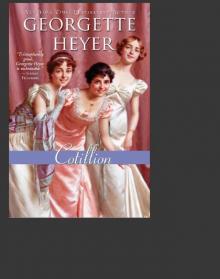 Cotillion
Cotillion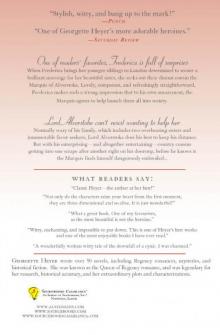 Frederica
Frederica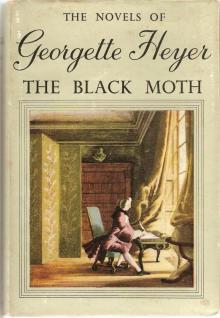 The Black Moth: A Romance of the XVIIIth Century
The Black Moth: A Romance of the XVIIIth Century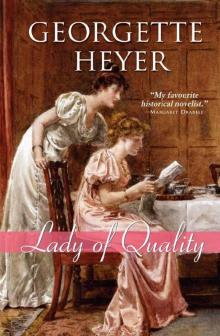 Lady of Quality
Lady of Quality Snowdrift and Other Stories
Snowdrift and Other Stories An Infamous Army
An Infamous Army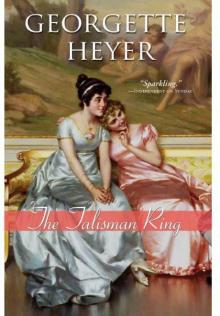 The Talisman Ring
The Talisman Ring Venetia
Venetia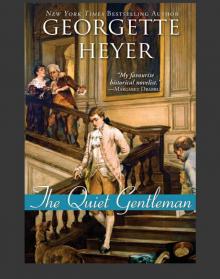 The Quiet Gentleman
The Quiet Gentleman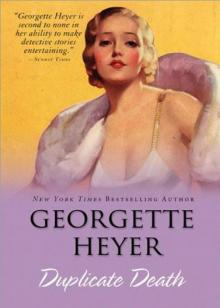 Duplicate Death
Duplicate Death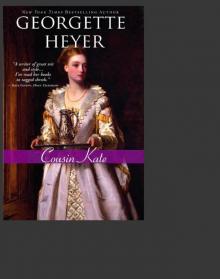 Cousin Kate
Cousin Kate Black Sheep
Black Sheep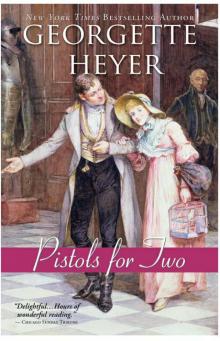 Pistols for Two
Pistols for Two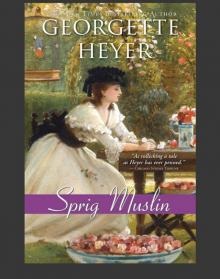 Sprig Muslin
Sprig Muslin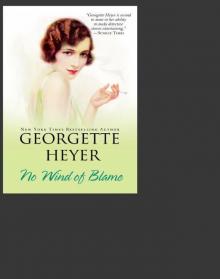 No Wind of Blame
No Wind of Blame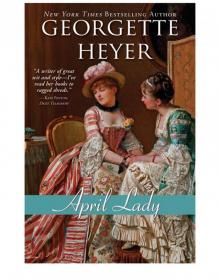 April Lady
April Lady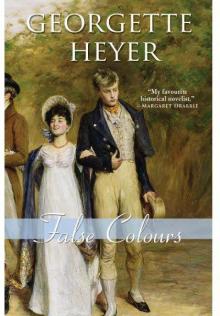 False Colours
False Colours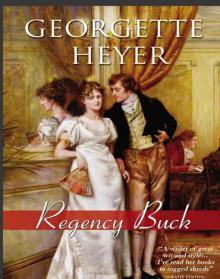 Regency Buck
Regency Buck The Toll-Gate
The Toll-Gate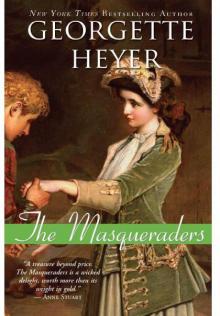 The Masqueraders
The Masqueraders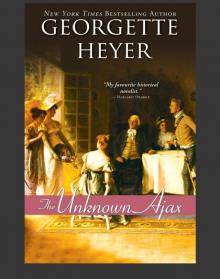 The Unknown Ajax
The Unknown Ajax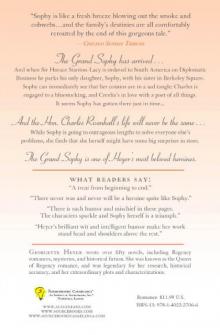 The Grand Sophy
The Grand Sophy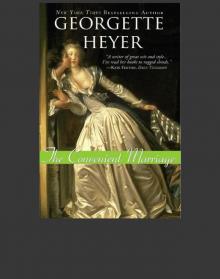 The Convenient Marriage
The Convenient Marriage Faro's Daughter
Faro's Daughter The Conqueror
The Conqueror The Foundling
The Foundling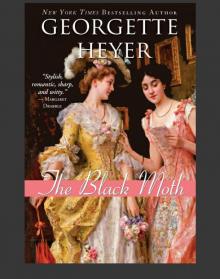 The Black Moth
The Black Moth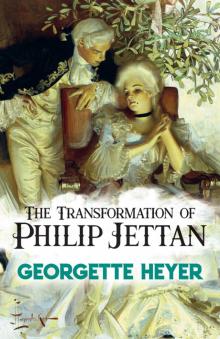 The Transformation of Philip Jettan
The Transformation of Philip Jettan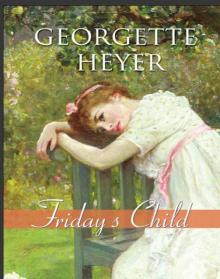 Friday's Child
Friday's Child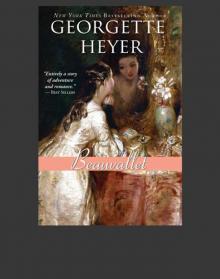 Beauvallet
Beauvallet They Found Him Dead
They Found Him Dead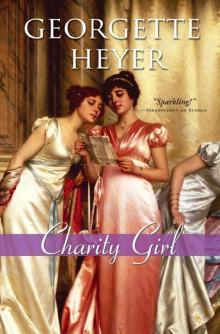 Charity Girl
Charity Girl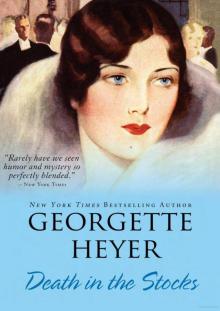 Death in the Stocks: Merely Murder
Death in the Stocks: Merely Murder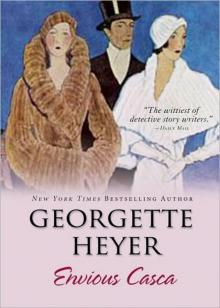 Envious Casca
Envious Casca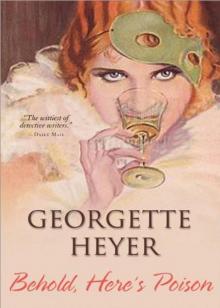 Behold, Here's Poison
Behold, Here's Poison Arabella
Arabella The Nonesuch
The Nonesuch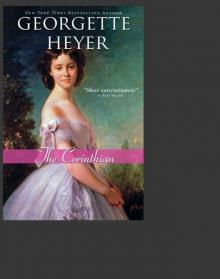 The Corinthian
The Corinthian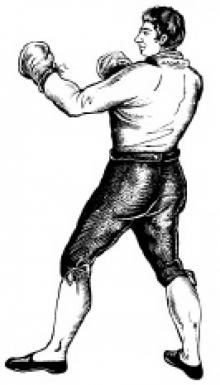 Jennifer Kloester
Jennifer Kloester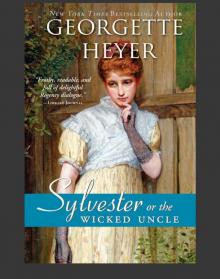 Sylvester
Sylvester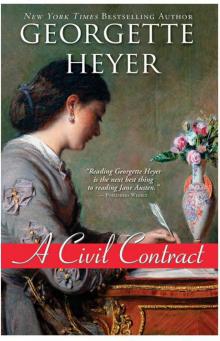 A Civil Contract
A Civil Contract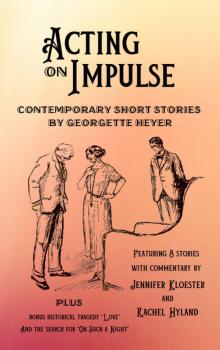 Acting on Impulse
Acting on Impulse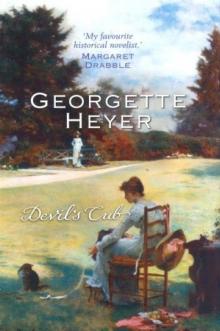 Devil’s Cub at-2
Devil’s Cub at-2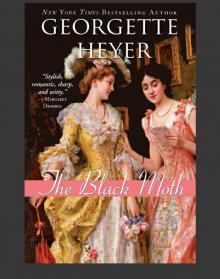 Black Moth
Black Moth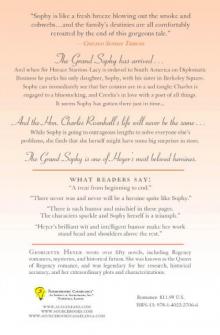 Grand Sophy
Grand Sophy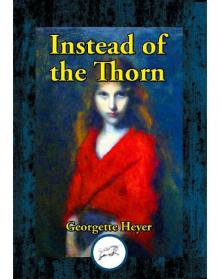 Instead of the Thorn
Instead of the Thorn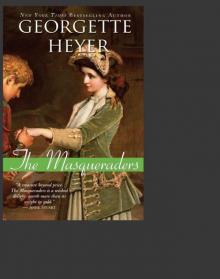 Masqueraders
Masqueraders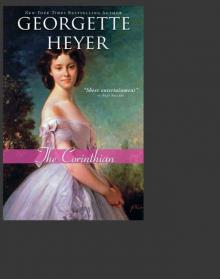 Corinthian
Corinthian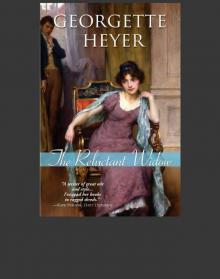 Reluctant Widow
Reluctant Widow